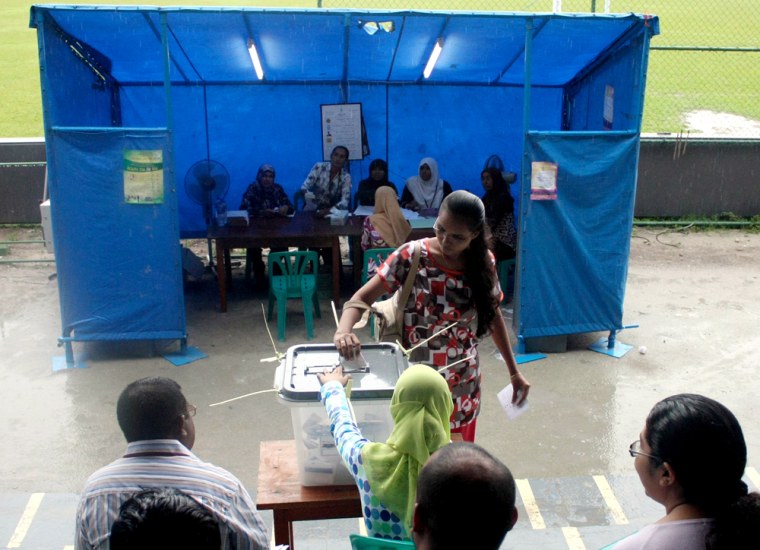Thousands of Maldivian islanders braved long lines, pouring rain and glitches in the voting rolls Wednesday to cast ballots in the first democratic presidential election in their tiny nation's history.
The vote was seen as a referendum on the 30-year-rule of President Mamoun Abdul Gayoom, who used a burgeoning tourist trade to turn the islands into an economic success story, but has been accused of cracking down on dissent and allowing cronies to dominate the economy.
"He has done a lot, he has really done a lot ... but now it's time for him to give room for other people to come up," said Ibrahim Zubaya, 52, who works for a mobile phone company.
But voting in this Sunni Muslim nation of 1,190 coral islands southwest of India got off to an inauspicious start, as hundreds of voters found their names missing from the rolls. Opposition officials accused the government of tampering but insisted the vote must continue.
Long lines
Mariya Didi, a parliamentarian and chairwoman of the opposition Maldivian Democratic Party, discovered she and her 10 siblings were not on the rolls. She eventually was told that her registration had been moved to another station, where she voted nearly six hours after she first got in line, she said.
After a hail of criticism, the election commission decided Wednesday afternoon to allow anybody with a valid ID to vote. The decision risked allowing some people to vote twice, but opposition officials said such rigging was unlikely to be significant and was preferable to disenfranchising voters.
"A lot of people who weren't able to vote are now able to vote," said Ahmed Shaheed, a vice presidential candidate.
Faida Farouk, a spokeswoman for Gayoom's ruling party, said the problems were understandable.
"Certainly because it is our first multiparty election, we are experiencing a lot of teething problems," she said.
New vs. old leadership
Gayoom's major opponents in the six-man race were Mohamed Nasheed, the charismatic leader of the MDP and a former political prisoner, and Hassan Saeed, a reform-minded former attorney general who is running on the ticket with Shaheed.
If no one wins an outright majority, the two top vote-getters will meet in a run off.
Long lines of voters huddled under umbrellas in a morning downpour in the capital, Male, fostering expectations of a high turnout.
As the rain subsided, Gayoom, who won six previous elections as the only name on the ballot, took his place in a line outside a school, and waited patiently under his bodyguards' gaze for more than an hour to cast his ballot.
Nasheed, who waited in similarly long line, attributed the turnout to the novelty of voting in a meaningful election.
"This would be the day when things actually changed in the Maldives," he said.
Many voters said they were hoping for new leadership to help foster more development and root out corruption.
Mariyam Rasheeda, a 30-year-old housewife, said her mother was prevented from inheriting land from her grandmother. Instead, a government crony got it, she said.
"It's time for a change," she said.
Popular support
But Gayoom remains popular on the outlying islands, and many here remain loyal to a man they feel has done much to develop what was once a poor nation of fishermen.
"In the last 30 years, the president has gained a lot of support," said Ahmed Didi, 38, who owns a construction company. "This is not the time to change the situation of people. Things are getting better, look around you."
The newly elected president will confront a growing heroin problem, increasing fundamentalism and the looming threat that rising sea levels caused by global warming will wash the country away.
Gayoom, who took power in 1978, began a government reform program in 2004 in the face of large-scale street protests and growing international pressure. A new constitution stripping much of the president's power, establishing independent courts and creating term limits was ratified in August.
